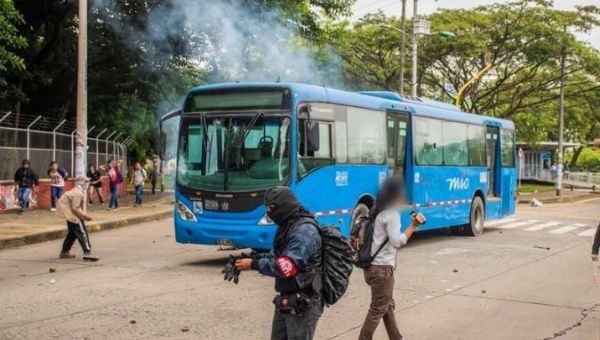
A public transport bus was reported affected during the riots, as well. Photo courtesy of Telesur
“During a demonstration in support of the National Minga between students against the Mobile Anti-Disturbances Squadron (Esmad) an explosive blast shook the University, near the Sintraunicol union headquarters,” said an official statement from the Students Assembly.
The students protested in defense of Colombia’s Regional Indigenous Council of Cauca (CRIC) and to reject the murder of minguero Jonathan Landinez, who lost his life on March 21 after an explosion that occurred in the indigenous reservation of Dagua, Valle.
Cali’s Security and Justice Secretary Andres Villamizar confirmed the casualty and more than six injured after the riots that took place. According to El Espectador, the wounded civilians who were transferred to the Valle del Lili Clinic suffered injuries due to the manipulation of explosive devices.
While the student’s statement asserts that “the facts are grounds for investigation, but it causes concern that at the time of the explosion and during the event, a drone and the helicopter of the national police was flying over.”
The “Minga for Defending Life, Territory, Democracy, Justice and Peace” is a collective action that began on March 10 with gatherings and demonstrations at the Cauca and Huila departments. Besides rejecting President Ivan Duque’s neoliberal policies, the Minga demands that the Colombian State complies with the previous agreements reached with social and political movements.
The Cauca’s communities have raised four main demands: the respect to their rights to land and autonomous government; the delivery of public resources for boosting their local economies; their right to be consulted about government decisions which could affect their territories or environment; and the real implementation of the Havana peace agreements.
Negotiated under the Juan Manuel Santos’ presidency (2010-2018), these agreements seek to regulate the presence of paramilitary and insurgent forces in the Cauca Valley. Despite this intention, the violence against the Colombian indigenous and peasants has continued and even increased.
According to the Indigenous spokespersons, at least 527 social leaders have been murdered nationwide. About 30 percent of them were killed in the Cauca region and, as a legal investigation has revealed, 44 percent of those killings were perpetrated by the Colombian Army.
